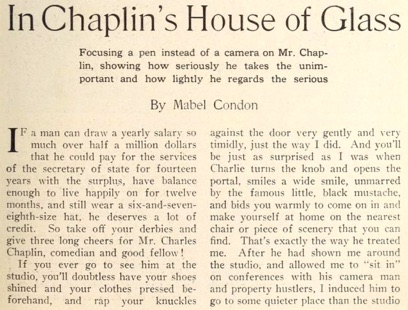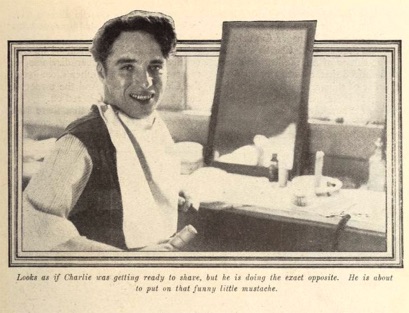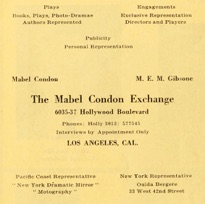The Cure Clippings 2/70
Mabel Condon, Picture-Play, New York, December 1916.
Mabel Condon, Manager
(...) Motion Picture News, July 22, 1916
& The Mabel Condon Exchange
(...) Motion Picture Studio Directory and Trade Annual, April 12, 1917
& Looks as if Charlie was getting ready to shave,
but he is doing the exact opposite. He is about to put on that
funny little mustache.
(...) Photo, Picture-Play, Dec. 1916.
„Comedy is such depressing work“
Editorial content. „In Chaplin‘s House of Glass
Focusing a pen instead of a camera on Mr. Chaplin,
showing how seriously he takes the unimportant
and how lightly he regards the serious
By Mabel Condon
IF a man can draw a yearly salary so much over half
a million dollars that he could pay for the services
of the secretary of state for fourteen years with the surplus,
have balance enough to live happily on for twelve
months, and still wear a six-and-seven-eighth-size hat. So take
off your derbies and give three long cheers
for Mr. Charles Chaplin, comedian and good fellow!
If you ever go to see him at the studio,
you‘ll doubtless have your shoes shined and your clothes
pressed beforehand, and rap your knuckles
against the door very gently and very timidly, just the way I did.
And you‘ll be just as surprised as I when Charlie turns
the knob and opens the portal, smiles a wide smile, unmarred
by the famous little, black mustache, and bids you
warmly to come on in and make yourself at home on the
nearest chair or piece of scenery that you can find.
That‘s exactly the way he treated me. After he had shown
me around the studios, and allowed me to ,sit in‘
on conferences with his camera man and property hustlers,
I induced him to go to some quieter place than the
studio stage and tell me something about himself. The q. p.
was the big, comfortable office of Manager Caulfield,
of the Lone Star studio. Charlie slid into the far corner of a
large leather divan, and I noticed that, contrary
to the natural order of things, he was the one that was
nervous, instead of me.
,I – I get horribly embarrassed,‘ confessed Charlie,
turning his six-and-seven-eighth panama round
and round and adjusting the black ribbon band thereon that
needed no adjusting. ,I – I‘m very ordinary. So ordinary
that there isn‘t a thing for me to talk about concerning myself.
If you want a story about my success, all all that, you
don‘t want an interview with me – you should be introduced
to my flexible bamboo cane and my little mustache.
They are in their dressing room now, resting, and I‘m perfectly
sure that they wouldn‘t mind having you consult them.‘
I laughed, but Charlie didn‘t. He looked as though he half
meant what he had said.
The panama hat seemed, of its own volition, and from
sheer dizziness, to reverse and spin the other direction
in the Chaplin hands. And the owner of both hat and hands
faltered on.
,I – I‘m so ordinary that there isn‘t a thing for me to talk
about, concerning myself. I suffer whenever I meet
a reporter, or interviewer. if they only weren‘t going to write
what I said – or if they only wrote what I said! I don‘t
know just which is the worse. I always feel as though I should
have some wonderful things to say –and I never have.‘
The Chaplin hat, now traveling between the Chaplin fingers
at the rat of at least thirty miles an hour threatened
to fly from its fingered moorings and depart one might never
know where – or maybe into the corral, immediately
without the window, and where the Chaplin pet goat was
holding solitary but bleating watch. By way of
safeguarding the hat, and also to bring peace to the heart
and manner of Mr. Chaplin, I volunteered:
,Interviews are so obsolete, don‘t you think?‘
He thought.
,And questions? I never ask questions.‘
A great peace settled itself over all
things, and the Chaplin voice, though resigned, had no
intimation of interview resignation about it.
,Comedy is such depressing work,‘ was what he was
saying. ,You‘ll always find a gloomier atmosphere
about a comedy studio than elsewhere.‘
He sighed.
,When I feel that I can do just what I want to do, I‘m
going to do drama.‘
,But –‘
,Yes – but I‘ll try it, anyhow. Even if i don‘t please
anybody but myself in trying it, I at least will be getting a change
of work.‘
,But to be able to make people laugh –‘
,That‘s just it,‘ eagerly took up Charlie, ,but does one
continue to make people laugh? That‘s always the
comedian‘s nightmare – that the time will come when they
won‘t laugh.‘
,Oh, they laugh!‘ I assured him, feeling of some assistance
in being able to truthfully say so.
,I hope so,‘ Charlie said, referring to the laughs and
people. ,I work hard to make them laugh – and I get
more temperamental every day. I wish‘ and he emphasized
the wish with a frown at the goat and a lemonless
lemon tree that reigned supreme outside the window – ,I wish
they wouldn‘t let me get temperamental. I don‘t want
to get temperamental,‘ he objected. ,But it‘s just because
people try to save me from so many things that
might be annoying. it makes me so self-conscious, being taken
care of that way.‘
,No, I‘ll never get used to temperament – or may pay check.‘
I suggested that the latter must be something of a
weekly shock, and the recipient of the shock agreed that it was.
,My ambition, when I started picture work, was
to make enough money, some time, so that I might retire with
the knowledge that I had enough to insure me a
twenty-five dollar-a-week income for the rest of my life. I was
sure, then, that I would be satisfied and happy with
that. My first contract, with the Keystone Company, was for
one hundred and seventy-five dollars per week.
I showed it to everybody I knew, and inwardly quaked with
the fear that I would never be able to fool them
into paying me that much for more than a few weeks. When
I had been there three months, I had some confidence
in myself, and knew enough to refuse an additional couple
hundred, knowing I could get more. I did. And
now that I‘ve got it, I don‘t know what to do with it.‘
A this sad statement, the sun, deciding
to sink behind the Hollywood foothills, threw a shaft of
brightness across one Chaplin food extended
in its grey-topped black shoe, and appearing radically
unChaplinesque in its neat smallness. Charlie
seemed to reflect upon this, and then proceeded.
,I don‘t spend much oft it,‘ referring to the
ten thousand a week plus a bonus. ,What might I buy?‘
he asked, as though hoping some one would
tell him. ,One thing that I have bought is service – valets
and things. I do love service,‘ he explained,
adding: ,There are so many things I have to do myself
that when I can buy anything to be done for me
I‘m glad to do it.‘
,Things haven‘t come easily to me all my life,‘ he offered,
reflectively dancing the foot in the sun motes. ,Things
were always rather hard. I was one of the unfortunate kind
who works hard for little money. I was known as
a good actor, but I never got any salary for it. I became
so that I didn‘t expect any – so when it did come,
it was quite extraordinary.‘
,The whole thing, though – playing, directing, and
thinking up something funny where funny things
never were – is a tremendous responsibility. I get depressed
thinking of it. You see, it‘s like this I should hate to think
that my pictures weren‘t making money for the firm releasing
them. My pride wouldn‘t stand that. So I try to think
up new laughs for new pictures all the time, and go at making
them as though I knew when I started just what I was
going to do in them.‘
,Suppose, though, you were going to take a long vacation
– then what?‘ And the fun man, who would give a great
deal to be entertained by some one as he himself entertains
millions, replied:
,Russia. The thought of it fascinates me.‘
,But how about an English castle – and a title, maybe?‘
And Charlie laughed a laugh of startlingly white
teeth and a forgetfulness of the problem of what to do with
his money, as he answered:
,Wouldn‘t my derby hat, loose trousers, big shoes, and
thin stick placed crosswise, make a wonderful coat
of arms on the carriage of ,Sir Charles Chaplin?‘ I‘d have
to buy in all the Charlie Chaplin prints – especially
the Tillie‘s Punctured Romance one, where all I did was kick
Marie Dressler. All though the making of the six
reels I was exhorted to ,Kick Marie Dressler.‘ And I did.‘
A plaintive bleat came through the window.
,My goat – he‘s hungry,‘ interpreted Charlie, and we walked
forth to greet the goat. It raced at us, a series of
brown-and-white leaps until brought to a sudden and violent
halt by the limitation of its rope.
,He‘s hungry,‘ repeated Charlie, patting the animal
affectionately as it stood on its hind legs and
imprinted clay hoof marks on the matty dark-blue shoulders
of the Chaplin well-fitting suit.
From a stout man, in a red sweater and the wings
of a set, came the remark:
,Hungry? I‘ve fed him bushels of everything all day!‘
,So‘ve i,‘ came another voice, as another
besweatered individual hove into sight, armed with a hammer
and nails.
,Oh, Charlie!‘ sang out Mr. Caulfield, in a pleased-with-himself
voice. ,I just gave your goat a bag of cakes!‘ And there
was the slam of the Caulfield managerial desk as it was shut
for the night.
,But somehow,‘ reflected Charlie, as though puzzling
over a wonderful mystery, ,he‘s always hungry.‘
He left the animal, and walked into the studio.
A kitchen set supplied with much prop food, a hallway
set equipped with wide and suspicious-looking
balustrades, a saloon set, bearing the unconvincing
name ,The Bulldog Rest,‘ were visible, and
Mr. Chaplin, waving a nonchalant hand toward all, said:
,My sets for tomorrow. The story? Sh-h-h!
I don‘t know yet. I only started making the picture yesterday.‘
And that statement told exactly how Chaplin
works. Everything that goes into his comedies is done
on the spur of the moment. He made sure that
all was in readiness for the following morning, and then led
the way out again. I suggested that a few ,at-home‘
photographs would make fireside reading for the waiting world.
,My only home life is here in the studio.‘ He pointed
up at the paned roof. ,I‘m one of those chaps who live in glass
houses.‘“
Redaktioneller Inhalt




